Please read my introduction to the first season of True Detective and my thoughts on the first episode. These posts are especially important in how the show navigates between 1995 and 2012.
“Seeing Things” focuses on three concepts: women, community, and religion. Although in this post I’m mostly examining the first, each of these topics is contrasted in two states: pure and innocent vs. violated and ravaged. Almost everything we see in True Detective suggests that things once worthy and good have become corrupted to such a degree that their latter state has become inevitable, acceptable, and even normal. We also see cycles of behavior that become ingrained and repeated in ways that suggest that those involved are helpless to prevent or stop them. Yet the observers, usually loved ones and family members, either cannot help in breaking the cycle or no longer care to.
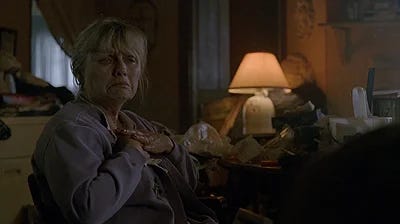
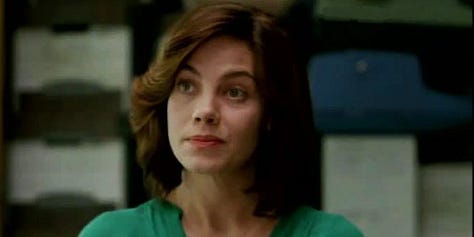

Although this episode touches on many themes, I’m limiting my scope to focus primarily on three women: Dora’s mother Mrs. Kelly (Tess Harper), Marty’s wife Maggie (Michelle Monaghan), and his lover, court stenographer Lisa Tragnetti (Alexandra Daddario). I also want to explore what each of these women want and how they go about getting it. Yet as important as these characters are, they all, in one way or another, directly or indirectly, point to Rust.
We learn early in the episode that Rust’s relationships with two women from his past have deteriorated. Talking to investigators Gilbough and Papania, he states, “Back then, not sleeping, I’d lay awake thinking about women. My daughter, my wife. It’s like something’s got your name on it, like a bullet, or a nail in the road.”
His comment suggests inevitability, things beyond human control. Rust’s comment indicates danger and possibly malevolence. Wives and daughters should be loved and protected, yet Rust is convinced that forces are actively working against such love and protection. So he lies awake, haunted by his past and his role in it. The candid nature of Rust’s thoughts is consistent with his earlier thinking on nihilism, fate, and the unpreventable, but these statements are more personal. They also prepare us for further illustrations of damaged women.
When interviewing Dora’s mother, Mrs. Kelly tells Marty and Rust that Dora “has always been in some kind of trouble.” Mrs. Kelly herself looks haggard, suffering from various illnesses and hardships, including her hands, ravaged from the use of chemicals while spending 20 years working in the dry cleaning business. That detail suggests she either didn’t understand the risks of such work, didn’t take precautions, or simply didn’t care. It also hints that the damage done to her from other toxic sources has proved far more deadly. Perhaps her life has been filled with similar unwise decisions (greater or lesser) that she passed onto her daughter1. Mrs. Kelly wants closure. Any parent in such a situation would, but she also seeks redemption, someone to let her off the hook for any part she may have played in her daughter’s death.
We (and the detectives) notice a disturbing photo on display showing a young Dora standing before a group of hooded men on horses. Our first thought might be “What’s going on here?” but our second may be, “Why would anyone keep this disturbing photo on display?” and “Is Mrs. Kelly complicit in what happened to Dora?” Yet Dora’s mom gives the detectives a vague bit of information that will emerge as another of True Detective’s major themes: religion. Before her murder, Dora had been attending some type of church.
Dora’s friend Carla (Amy Brassette) confirms this, telling Marty and Rust that Dora had been seeing some guy who probably considered Dora an “easy target.” Dora may have genuinely sought out the church for spiritual strength and direction yet instead found someone seeking to take advantage of her. This is not the last time in this episode where we encounter what should be a place of safety and refuge turning into a deadly nightmare.
The photo relates to another disturbing moment when Marty calls his young daughters to supper, then sees the girls’ action figures (five men and one woman) posed in a way that resembles a gang rape. Marty and Rust’s later visit to a “bunny farm” results in Marty’s disgust at what these young “prosts” are doing with their lives, with Marty going so far as to give a young woman named Beth (Lili Simmons) money to “Do something else” with her life.
After leaving Mrs. Kelly, Marty reflects on his own mom, a Donna Reed type who packed lunches and told bedtime stories. Then Marty asks Rust, “Your mom still alive?” Rust looks at the landscape and replies, “Maybe.”
The conversation actually tells us more about Marty than it does Rust. Marty seems to see his wife Maggie as a Donna Reed type who takes care of the girls, prepares meals, and keeps house. During a later argument with Maggie, Marty accuses her of whining about their relationship. “It’s supposed to be what I need. I need you to be strong so I can do my job.” Not only is Marty self-centered, he’s also emotionally distant from Maggie, which is contrasted in the dinner scene with Rust from the first episode.
In “The Long Bright Dark,” when Marty leaves the table to set up the call that will allow Rust the opportunity to leave, Rust and Maggie have an interesting conversation about police work. Maggie senses that Rust is (eventually) open and honest about his work in a way that Marty isn’t. Watch Rust and Maggie’s eyes and body language, then contrast it with that of Marty and Lisa (which I’ll comment on next). Maggie wants intimacy. She wants it from her husband, but Marty is primarily a closed door. Although Maggie has to pull it out of him, Rust does share his thoughts with her, and, unlike Marty, he listens to Maggie. She’s communicating and connecting with Rust, and if we take his earlier statement about lying awake and thinking about women, he’s now faced with a situation that could’ve happened with his wife and daughter. And he longs for it.
When Rust decides to stay, Marty is clearly upset. The look on his face is one of betrayal, both by his wife and his partner. After Rust has left, Maggie asks Marty about his relationship with Rust. “You ever ask him about himself?” she says, knowing from experience the answer is no.
Yet Marty is fine with disclosing details of the current murder case with his lover Lisa. Everyone who’s seen True Detective remembers the scene with Marty in Lisa’s apartment for obvious reasons, and I’ll break down some of this moment without commenting on Lisa’s anatomy. But before Marty visits her, he has a few drinks at the local bar.
Here Marty tells a group of off-duty cops a dirty sex story that may or may not be true, but it hints at his infidelity just the same. Immediately we jump to 2012 where Marty attempts to justify his cheating to the CID investigators, “You’ve got to decompress before you can be a family man… It’s for your wife and kids, too. You got to take your release where you find it or where it finds you.” And he does exactly that with Lisa.
Before she removes it, Lisa is wearing a white short-sleeve shirt (see the earlier collage photo with Lisa on the right), but it looks dingy inside her apartment. In fact everything there is engulfed in a squalid yellow aura, a place devoid of vibrancy. The curtains, furniture, generic decorations - they all lack color and life. Oddly enough, there’s light coming in through the curtained windows, although it was nighttime when Marty entered the apartment, which may suggest that everything in the inside, including Lisa, is artificial, not as it appears2.
As mentioned before, Marty tells Lisa far too much about the Dora Lange case. Even though she’s a court stenographer and knows some aspects of the case, she’s learning information she shouldn’t hear. With both the case and his physical intimacy, he’s disclosing to Lisa what he should’ve kept to himself. Ironically, she “punishes” Marty by handcuffing him (with the cuffs that he brought her as a present) and reads him his Miranda rights before they get down to business.
There’s sex, but no intimacy. The exhilaration Marty feels is false and deceptive. Lisa is using sex as a manipulative weapon. Marty is literally bound and helpless in a way he thinks is amazing, but his helplessness will end in devastating hurt and tragedy. Yet Lisa never lies about her own motivations. When Marty, out of concern for her safety, tells Lisa to “stay home” until the killer is caught, she responds, “I can’t meet a nice man at home… Since you’re married, I need to consider my options. I want things, Marty.” Lisa sees Marty as a ticket out of this apartment and into a better life, that’s all. Also ironically, Marty never realizes that the intimacy he really wants is in his own home. Lisa is a dead end, yet one that’s going to sting for a long time.
The first of many stings comes the next day when Rust and Marty are in the locker room preparing for work. Marty gets a taste of the consequences of his affair when Rust mentions that the smell of sex is all over Marty. Marty reflexively responds with an attack, grabbing Rust’s shirt. Rust calmly speaks, “You got some self-loathing to do this morning, that’s fine, but it ain’t worth losing your hands over.” Realizing that Rust has a firm, vice-like grip on his hands, Marty knows he’s outmatched, but doesn’t realize that he’s outmatched in so many other ways he can’t begin to understand.
Although the ending of this episode, including the discovery of the ruins of a church Dora may have frequented, deserves attention, I have chosen (for now) to focus on the women in “Seeing Things.” Stay tuned for more in future posts. I look forward to hearing your comments. Thank you for reading.
Not to put too fine a point on this, but the South is often plagued with those who ignore things, people, and lifestyles that can potentially damage or destroy. This often manifests itself in not taking care of yourself, lack of planning for the future, etc. The region certainly doesn’t have a monopoly on such choices, but you don’t have to look very far to find them.
We also see a framed photo of a couple and a young child. Whether this is Lisa and a former lover or ex-husband is unclear. It could be a sibling, cousin, etc. Regardless, if Marty even saw the picture, it wasn’t enough to make him think of his own wife and family.




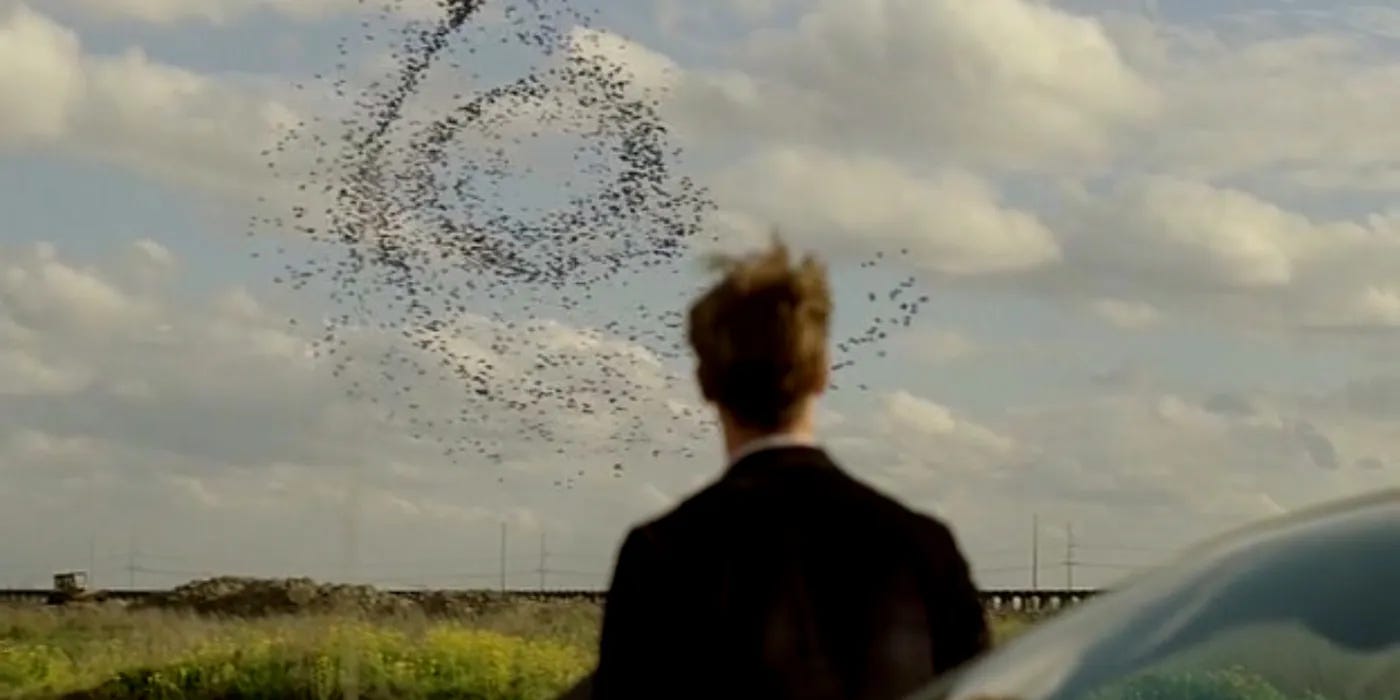
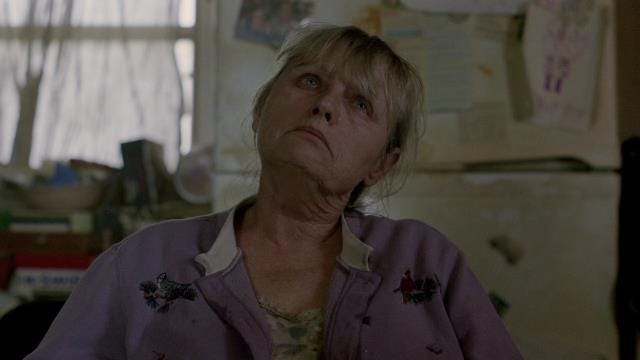
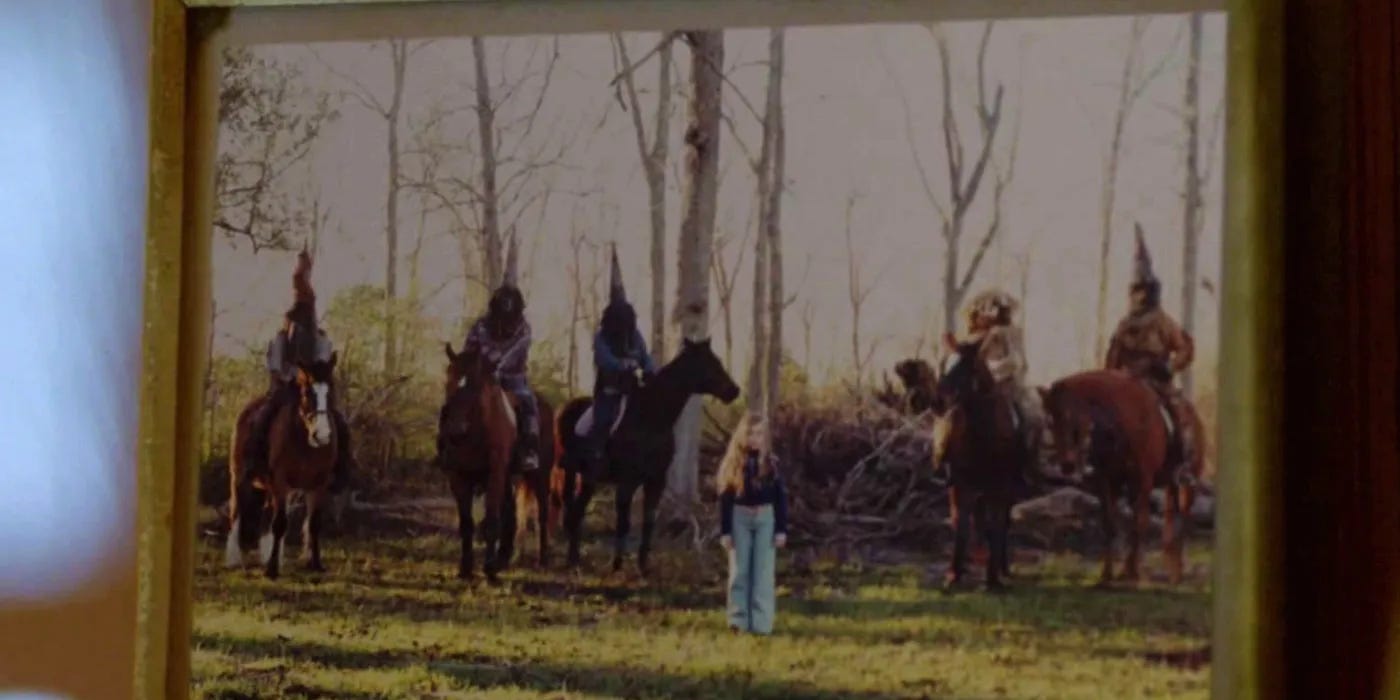
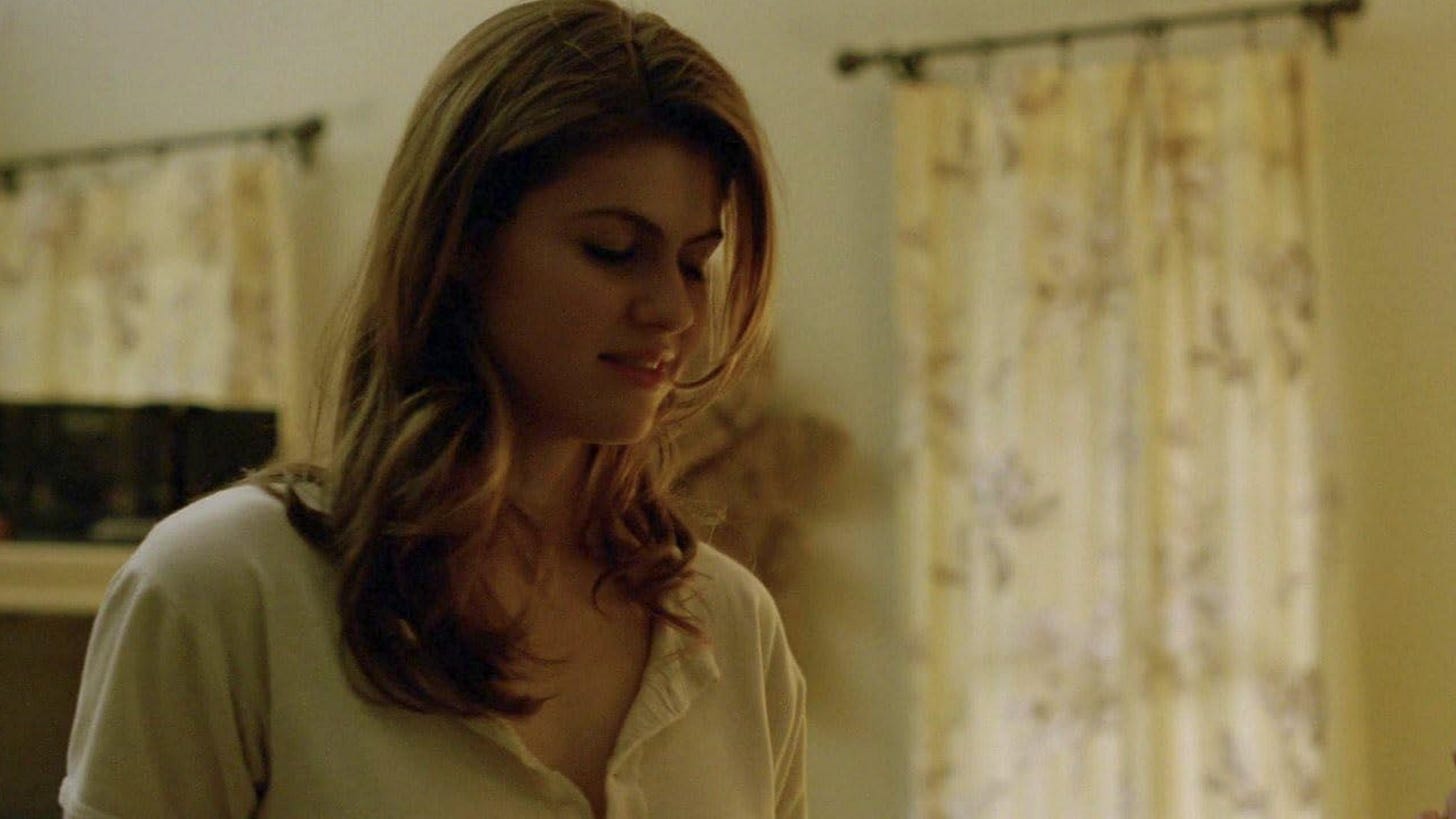
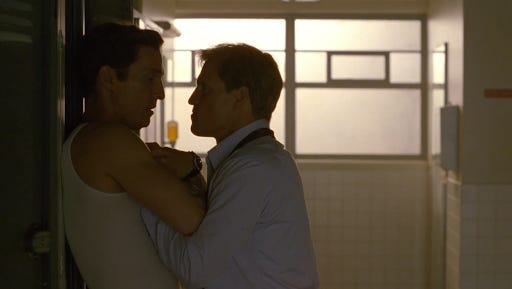
I'm thinking of Dora's mom, and Tess Harper's heartbreaking work in her small but very significant role. Season 1 has exceptional casting in every episode.
As a fellow Southerner, Andy, I have lived around the edges of many people with jobs that were not good for them in any way, or safe for them. Including some of my family members.
Yet they did it, year after year, feeling they lacked any better choices. I recognize a lot of folks in the face and hands of Dora's mom.
Those in charge saw them as expendable, and not worth any added expense of protection, which was never required by any entity in at will employment states.
Rewatching Mrs. Kelly's scene, I think of current workers in the dry cleaning business today, in cities around us all, making enough money to get by but not enough to escape, all the while working around chemicals that will do to them what they did to Mrs. Kelly.
The writing in episode two for characters like Mrs. Kelly, the insight into her life, was so good.